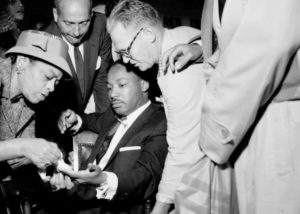The Harlem Hospital That Saved Martin Luther King, Jr.
A decade before Martin Luther King, Jr. was felled by a sniper’s bullet, he nearly died after being stabbed in the shoe section of a Harlem department store. The 29-year-old preacher had been sitting in a roped-off section of Blumstein’s Department signing copies of Stride Toward Freedom, his memoir about the year-long Montgomery Bus Boycott, when a mentally ill woman named Izola Ware Curry plunged a seven-inch penknife into King’s chest with such force that it snapped the handle.With the knife still lodged in his sternum, King was carried in his chair to an ambulance and rushed to Harlem Hospital. Called away from a wedding at the Waldorf Astoria by news of the emergency, Dr. Emil Naclerio hurried to the hospital still clad in his tuxedo while Dr. John Cordice also rushed in from New Jersey. Few thoracic surgeons were better prepared to save King’s life than Cordice, who was African-American, and Naclerio, a son of Italian immigrants; both were experienced at treating stabbing victims. For more than two hours, the pair performed delicate emergency surgery on King, removing two ribs from his side to safely dislodge the knife.
“Had Dr. King sneezed or coughed, the weapon would have penetrated the aorta. He was just a sneeze away from death,” Naclerio was quoted as saying by Jet magazine in the aftermath of the stabbing.
Nearly a decade later, on April 3, 1968, King spoke of this close call in a dramatic speech to nearly 2,500 people crowded into the Mason Temple in Memphis, Tennessee, where he had come to support striking sanitation workers. Recounting his near-death experience, King said, “I want to say tonight, I, too, am happy I didn’t sneeze, because if I had sneezed, I wouldn’t have been around in 1960, when students all over the South started sitting in at lunch counters.”
He told the audience that if he had sneezed, he would have missed the Freedom Riders, the Selma to Montgomery march, the 1964 passage of the Civil Rights Act and the March on Washington in which he delivered his famous “I Have a Dream Speech.” “If I had sneezed, I wouldn’t have been in Memphis to see a community rally around those brothers and sisters who are suffering. I’m so happy that I didn’t sneeze.”
King ended his famous “I’ve Been to the Mountaintop” speech with a rhetorical flourish in which he seemed to prophesy his own death. Less than 24 hours later, an assassin’s bullet felled King as he stood on the balcony of the Lorraine Motel. Click here to read more about this story.
